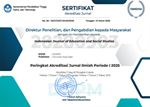Abdurrohman, Pageh, I. M., Mudana, I. W., & Margi, I. K. (2025). The Role of the Hidden Curriculum in Fostering Tolerance: A Case Study of Public High Schools in Mataram City. Educational Process: International Journal, 15, e2025160. https://doi.org/10.22521/edupij.2025.15.160
Ahmed, M. A. O., Zhang, J., Fouad, A. S., Mousa, K., & Nour, H. M. (2025). The Dark Side of Leadership: How Toxic Leadership Fuels Counterproductive Work Behaviors Through Organizational Cynicism and Injustice. Sustainability (Switzerland), 17(1), 105. https://doi.org/10.3390/su17010105
Ahmed, S. K. (2024). The Pillars of Trustworthiness in Qualitative Research. SSRN Electronic Journal, 2, 100051. https://doi.org/10.2139/ssrn.4965351
Al-Shallakh, M. A. I. (2024). Embedding Artificial Intelligent Applications in Higher Educational Institutions to Improve Students’ Pronunciation Performance. Theory and Practice in Language Studies, 14(6), 1897–1906. https://doi.org/10.17507/tpls.1406.31
Chiadmi, N. E., Souiden, N., Chaouali, W., & Chan, A. (2025). Co-Creating the Tourist’s Experience With a French Touch: The Case of a Perfume Museum in Paris. Qualitative Market Research, 28(2), 256–276. https://doi.org/10.1108/QMR-10-2023-0144
Cole, R. (2024). Inter-Rater Reliability Methods in Qualitative Case Study Research. Sociological Methods and Research, 53(4), 1944–1975. https://doi.org/10.1177/00491241231156971
Coleman, P. (2021). Validity and Reliability Within Qualitative Research in the Caring Sciences. International Journal of Caring Sciences, 14(3), 2041. www.internationaljournalofcaringsciences.org
Dignath, C., Rimm-Kaufman, S., van Ewijk, R., & Kunter, M. (2022). Teachers’ Beliefs About Inclusive Education and Insights on What Contributes to Those Beliefs: A Meta-Analytical Study. Educational Psychology Review, 34(4), 2609–2660. https://doi.org/10.1007/s10648-022-09695-0
Dodlek, I. (2024). Values in Narratives: Religious Education as an Exercise in Emotional Rationality. Religions, 15(10), 1283. https://doi.org/10.3390/rel15101283
Hatami, A., Hermes, J., & Firoozi, N. (2023). Moral Laxity – The Cognitive Gap Between True and Pseudo Corporate Social Responsibility. Critical Perspectives on International Business, 19(4), 526–549. https://doi.org/10.1108/cpoib-03-2021-0029
Hawe, E., Dixon, H., & Hamilton, R. (2021). Why and How Educators Use Exemplars. Journal of University Teaching and Learning Practice, 18(3), 1–15. https://doi.org/10.53761/1.18.3.10
Islamic, G., Supriyono, Ishaq, M., & Dayati, U. (2024). Character Education Through Philosophical Values in Traditional Islamic Boarding Schools. Kasetsart Journal of Social Sciences, 45(1), 31–42. https://doi.org/10.34044/j.kjss.2024.45.1.04
Janis, I. (2022). Strategies for Establishing Dependability Between Two Qualitative Intrinsic Case Studies: A Reflexive Thematic Analysis. Field Methods, 34(3), 240–255. https://doi.org/10.1177/1525822X211069636
Kamran, M., Siddiqui, S., & Adil, M. S. (2023). Breaking Barriers: The Influence of Teachers’ Attitudes on Inclusive Education for Students With Mild Learning Disabilities (MLDs). Education Sciences, 13(6), 606. https://doi.org/10.3390/educsci13060606
Kartono, D. T., Suyanto, B., Sugihartati, R., Yani, M. T., Sirry, M., Suryadinata, T. A., Prasetyo, B. J., & Andriani, L. (2025). Tolerance of High School Students in an Urban-Transition City: A Study in Batu City. Cogent Education, 12(1), 2445364. https://doi.org/10.1080/2331186X.2024.2445364
Kim Pham, C., Chong, S. L., & Wan, R. (2023). A Phenomenographic Research Study of Students’ Conceptions of Silence in Face-to-Face English as a Foreign Language Learning. SAGE Open, 13(4), 21582440231216344. https://doi.org/10.1177/21582440231216343
Masdul, M. R., Pajarianto, H., Rajindra, R., Ahmad, J., Kuliawati, K., & Rahmawati, R. (2024). Acculturation of Religious Values in Early Childhood: Central Sulawesi Educational Institutions. South African Journal of Childhood Education, 14(1), 1–7. https://doi.org/10.4102/sajce.v14i1.1530
Miller, E. M., Porter, J. E., & Barbagallo, M. S. (2023). Simplifying Qualitative Case Study Research Methodology: A Step-By-Step Guide Using a Palliative Care Example. Qualitative Report, 28(8), 2363–2379. https://doi.org/10.46743/2160-3715/2023.6478
Mujahid, I. (2021). Islamic Orthodoxy-Based Character Education: Creating Moderate Muslim in a Modern Pesantren in Indonesia. Indonesian Journal of Islam and Muslim Societies, 11(2), 185–212. https://doi.org/10.18326/ijims.v11i2.185-212
Muzakkir, Hussin, Z., & Razak, R. A. (2024). Teachers’ Beliefs Towards Character Education Curriculum in Primary School: A Systematic Literature Review. Education 3-13, 52(8), 1178–1192. https://doi.org/10.1080/03004279.2022.2142478
Prayitno, H. J., Huda, M., Inayah, N., Ardi, H., & Yusof, N. (2021). Politeness of Directive Speech Acts on Social Media Discourse and Its Implications for Strengthening Student Character Education in the Era of Global Education. Asian Journal of University Education, 17(4), 179–200.
Ray, P., Reddy, S. S., & Banerjee, T. (2021). Various Dimension Reduction Techniques for High Dimensional Data Analysis: A Review. Artificial Intelligence Review, 54(5), 3473–3515. https://doi.org/10.1007/s10462-020-09928-0
Sastra Negara, A. H., Waston, Hidayat, S., & Mulkhan, A. M. (2024). Development of Religious Character To Improve the Effectiveness of Teacher and Student Communication. Revista de Gestao Social e Ambiental, 18(6), 1–26. https://doi.org/10.24857/rgsa.v18n6-037
Schöllhorn, W. I., Rizzi, N., Slapšinskaitė-Dackevičienė, A., & Leite, N. (2022). Always Pay Attention to Which Model of Motor Learning You Are Using. International Journal of Environmental Research and Public Health, 19(2), 711. https://doi.org/10.3390/ijerph19020711
Suddahazai, I. H. K. (2023). Reflecting on Teaching Practice: Adopting Islamic Liberatory Pedagogies Within Muslim Institutes of Higher Education in UK (MIHEUK). Religions, 14(2), 223. https://doi.org/10.3390/rel14020223
Tran, K. Q., & Guzey, S. S. (2024). Good Intentions Are Not Enough: A Case Study Uncovering Perpetuation of Internalized and Interpersonal Oppression in Middle School STEM Classrooms. Journal of Research in Science Teaching, 61(3), 706–735. https://doi.org/10.1002/tea.21924
Wang, D., Huang, L., Huang, X., Deng, M., & Zhang, W. (2024). Enhancing Inclusive Teaching in China: Examining the Effects of Principal Transformational Leadership, Teachers’ Inclusive Role Identity, and Efficacy. Behavioral Sciences, 14(3), 175. https://doi.org/10.3390/bs14030175
Wang, Y., Huang, H., Rudin, C., & Shaposhnik, Y. (2021). Understanding How Dimension Reduction Tools Work: An Empirical Approach to Deciphering T-SNE, UMAP, TriMap, and PaCMAP for Data Visualization. Journal of Machine Learning Research, 22(201), 1–73.
Xiang, R., Wang, W., Yang, L., Wang, S., Xu, C., & Chen, X. (2021). A Comparison for Dimensionality Reduction Methods of Single-Cell RNA-Seq Data. Frontiers in Genetics, 12, 646936. https://doi.org/10.3389/fgene.2021.646936
Zairul, M. (2021). Can Member Check Be Verified in Real Time? Introducing Arc (Asking, Record, Confirm) for Member Checking Validation Strategy in Qualitative Research. Engineering Journal, 25(1), 245–251. https://doi.org/10.4186/ej.2021.25.1.245
 (Universitas Nurul Jadid)
(Universitas Nurul Jadid) 



